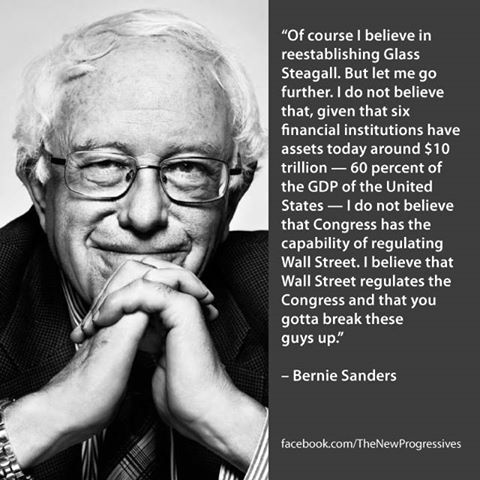
"Biblical Argument For Bernie Sanders"
By Jim The Evangelical Pastor
http://paxonbothhouses.blogspot.com/2015/09/biblical-argument-for-bernie-sanders-by.html
Sanders’s claim that the African-American community ‘lost half of their wealth’ in the Wall Street collapse
Michelle Ye Hee Lee
“As I understand it, the African-American community lost half of their wealth as a result of the Wall Street collapse.”
–Bernie Sanders, Democratic debate on PBS, Feb. 11, 2016
The intensifying competition for minority votes was evident during the most recent Democratic debate, where Bernie Sanders and Hillary Clinton consistently pivoted to statistics about minority communities. This particular claim by Sanders was jarring and called for a deeper look at the statistic. Was Sanders correct?

The Facts
The Sanders campaign pointed to research commissioned by the National Association of Real Estate Brokers, for the 2013 State of Housing in Black America report. It found that the collapse of the housing market and the Great Recession resulted in “extremely high levels of unemployment, a dramatic reduction in the homeownership rate and a massive loss of wealth for African American families.”
The loss of jobs and homes resulted in the African American community losing more than half of its net worth, according to the report. The report uses Pew Research Center’s findings from 2011 of the Great Recession’s impact by race and ethnicity.

The 2011 Pew report uses household net worth (assets minus liabilities, or debt) from the Census Bureau’s 2005 and 2009 Survey of Income Program and Participation, which measures wealth and asset ownership.
Median net worth for U.S. households fell from $96,894 in 2005 to $70,000 in 2009 (in 2009 dollars) — a 28 percent decline. From 2005 to 2009, African Americans experienced a 53.2 percent decline in median household net worth ($12,124 to $5,677, in 2009 dollars).


Figures from 2011 were released after the report, and the trend remained consistent: Median net worth for all households fell 32.3 percent, but minority households experienced steeper declines. From 2005 to 2011, African Americans’ median household net worth declined 45 percent in 2011 dollars. Hispanics’ median net worth fell 58 percent, and Asians by 48 percent. White households, in comparison, fell 22 percent.
An owned home was the biggest asset for most households, especially for black and Hispanic households that are more dependent on home equity as their source of wealth, Pew researchers found.
The loss of wealth other than home equity was modest, regardless of the race or ethnicity — meaning almost all the decline in wealth experienced during the Great Recession came out of housing, said Rakesh Kochhar, associate research director at Pew Research Center. White and Asian households were much more likely than Hispanic and black households to own financial assets.


Job losses as a result of the Great Recession were higher for black and Hispanic workers than for white workers, the Pew report found. The decline in household income also was greater for minority households.
In 2014, Pew researchers analyzed 2007-2013 data from the Federal Reserve’s Survey of Consumer Finances, which has a smaller sample size than the Census data. The trend was consistent with the Census data: From 2007 to 2013, Americans’ median net worth decreased by 40 percent and African Americans’ median net worth decreased by 43 percent, using 2013 dollars.
Since the two data sets differ, it’s important to look at the trend, Kochhar said: “In either case, you get substantial decline in the wealth of black households, approximating or nearing half of their starting wealth.”


Normally, we would advise politicians against relying on economics data from three to five years ago. But after extensive digging we found that 2013 is as recent as it gets for national wealth breakdowns by race. Updated Federal Reserve figures are expected by the end of 2016, so we will look out for the new figures and update accordingly.
Several experts we interviewed said they don’t anticipate the black community’s wealth to have increased significantly since 2013.
“You would have to have a situation where people were able to somehow pay off prior home-related debts, home mortgage debts and get back into a home for you to have some sort of dramatic effect associated with homeownership,” said William “Sandy” Darity, Jr., director of Duke University’s Samuel Dubois Cook Center on Social Equity, currently doing its own research into wealth in communities of color. “There’s no reason to believe that blacks or Latinos have become heavy buyers of stocks and bonds. I’m not sure where this growth in wealth would come from [after 2013].”
There may be modest increases in wealth due to the appreciation of home values since 2013, said James Carr, housing finance expert who did the research for National Association of Real Estate Brokers. But black homeownership rate and labor participation rate haven’t stabilized or recovered enough to indicate a significant improvement, Carr said.
The homeownership rate in fourth quarter of 2015 (41.9 percent) for African Americans was lower than it was in fourth quarter of 2007 (47.7 percent). And markets that have seen the most recovery — in states like Arizona, California and Florida — don’t have high concentrations of black homeowners.

The Pinocchio Test
Census data from 2005-2011 and Federal Reserve data from 2007-2013 support Sanders’s assertion about such staggering loss in wealth (43 to 53 percent loss, depending on the time frame and data used) among African Americans. Most of the loss in wealth was due to people losing owned homes — the major source of wealth in the black and Hispanic communities.
These data are more outdated than we generally require at The Fact Checker, especially since many communities have started seeing wealth recover since the crash. But there were no comparable, post-2013 national data to update the figure. Moreover, housing finance experts we consulted said they don’t anticipate black wealth to have increased significantly since 2013. We will look for the updated Federal Reserve data, anticipated by the end of this year, to see if politicians should update their talking points on this matter. Until then, Sanders earns the coveted Geppetto Checkmark.
The Geppetto Checkmark


No comments:
Post a Comment